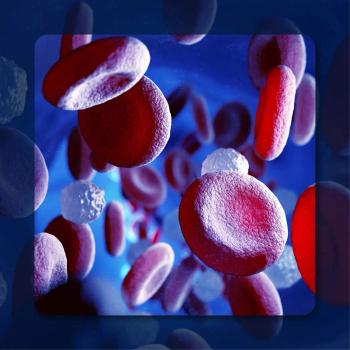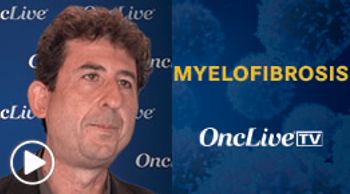
Myeloproliferative Neoplasms
Latest News

Post Hoc Data Show Anemia Benefits, Reduced Transfusion Burden With Momelotinib in Myelofibrosis
Latest Videos

CME Content
More News

Adrián Mosquera Orgueira, MD, PhD, discusses research to improve machine learning models for predicting post-transplant survival outcomes in myelofibrosis.

Anthony M. Hunter, MD, discusses the role of momelotinib for the treatment of adult patients with myelofibrosis and moderate to severe anemia.

The top 5 OncLive videos of the week cover insights in myelodysplastic syndrome, lung cancer, hepatocellular carcinoma, colorectal cancer, and ovarian cancer.

Aaron Gerds, MD, details the prevalence of anemia in patients with low- to intermediate-1–risk myelofibrosis.

The FDA has granted fast-track designation to givinostat for the treatment of patients with polycythemia vera.

Juan Carlos Hernández-Boluda, MD, PhD, details the advantages of EBMT machine learning vs existing transplant risk assessment tools in myelofibrosis.

Patients with myelofibrosis who initiated ruxolitinib within 2 years of diagnosis achieved higher spleen response rates vs those with delayed initiation.

Pankit Vachhani, MD, discusses the ongoing investigation of navtemadlin either alone or as an add-on to ruxolitinib for patients with myelofibrosis.

Mikkael A. Sekeres, MD, discusses questions that remain unanswered regarding the association between smoking and MDS development and progression.

Claire Harrison, MD, FRCP, FRCPath, discusses factors informing treatment selection for patients with myelofibrosis.

Raajit Rampal, MD, discusses treatment decision-making factors, such as JAK inhibitor efficacy and signs of treatment failure, for myelofibrosis.

The top 5 OncLive videos of the week cover insights in multiple myeloma, AL amyloidosis, myelofibrosis, breast cancer, and sarcoma.

Nogapendekin alfa inbakicept sBLA in NMIBC has been filed to FDA for review, a bexmarilimab combination elicits responses in MDS, and more from OncLive.

Juan Carlos Hernández-Boluda, MD, PhD, discusses the development of an EBMT machine learning model for predicting allo-HCT risk in myelofibrosis.

Donal McLornan, MBBCh, MRCP, PhD, FRCPath, explains the challenges of choosing optimal timing for allogeneic hematopoietic cell transplantation in myelofibrosis.

Adrián Mosquera Orgueira, MD, PhD, discusses whether machine learning could accurately predict OS and NRM outcomes after allo-HSCT in myelofibrosis.

The addition of bexmarilimab to azacitidine elicited an ORR of 63% among patients with relapsed/refractory higher-risk myelodysplastic syndrome.

Juan Carlos Hernández-Boluda, MD, PhD, discusses the rationale for using machine learning to predict OS outcomes after allo-HCT in myelofibrosis.

The top 5 OncLive videos of the week cover insights in myelofibrosis, chronic lymphocytic leukemia, colorectal cancer, breast cancer, and ovarian cancer.

Raajit Rampal, MD, discusses typical clinical applications of the 4 FDA-approved JAK inhibitors for the treatment of patients with myelofibrosis.

Mikkael A. Sekeres, MD, discusses the implications of a study that found associations between smoking intensity and disease progression in MDS.

James K. McCloskey II, MD, discusses the advantages of the oral formulation of decitabine plus cedazuridine for patients with MDS and CMML.

Donal McLornan, MBBCh, MRCP, PhD, FRCPath, discusses future research directions for an EBMT machine learning model for identifying and stratifying transplant risk in myelofibrosis.

Juan Carlos Hernández-Boluda, MD, PhD, discusses an EBMT machine learning–based model for identifying and stratifying transplant risk in myelofibrosis.

Raajit Rampal, MD, PhD, discusses current JAK inhibitor treatment options for myelofibrosis and additional therapies being evaluated in clinical trials.











































